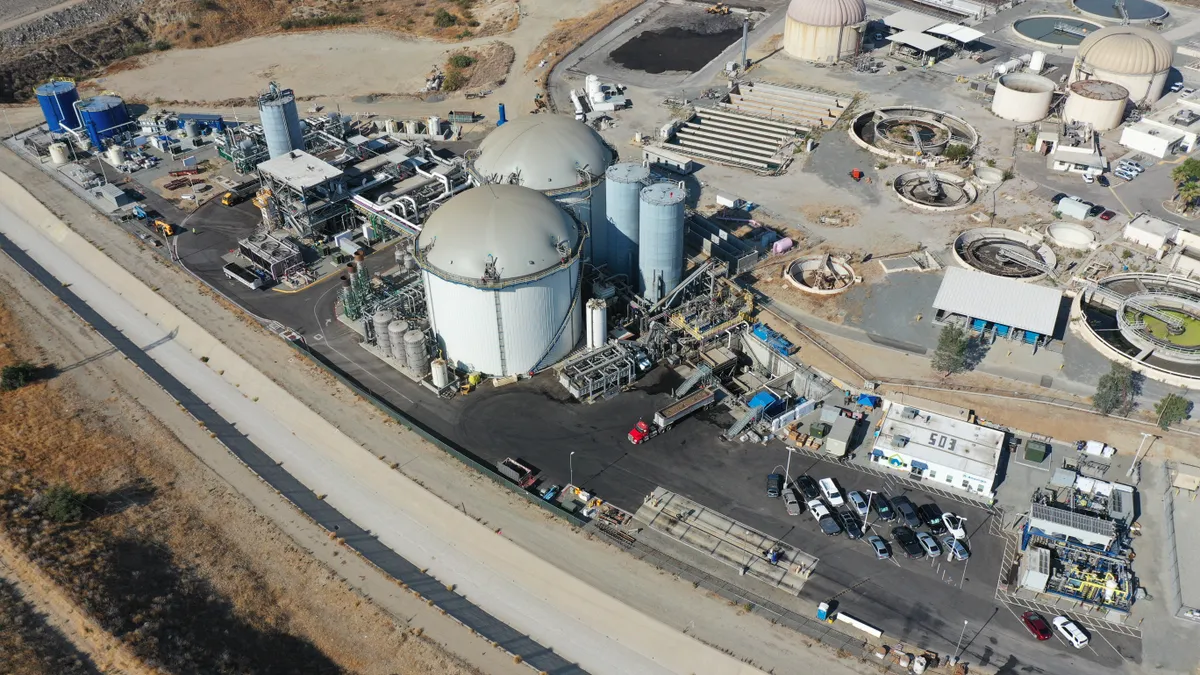All financial information is in Canadian dollars.
- Rialto Bioenergy delays: Anaergia's Rialto Bioenergy Facility, which takes in food waste and biosolids diverted from landfills in the Los Angeles metro region, is struggling to reach full capacity. When Anaergia announced the project, Rialto was touted as “the largest food waste diversion and energy recovery facility in North America,” capable of processing 700 tons of food waste and 300 tons of biosolids per day. Since the project was completed in 2020, Rialto has seen sluggish growth in feedstock, largely attributed to the delayed rollout of the RecycLA commercial organics program. Los Angeles began operating the program in December and can begin to issue fines to waste haulers not in compliance in January 2024. Anaergia said it was undergoing a strategic review of the facility, including potentially refinancing the $117 million in tax-exempt bonds issued by the California Pollution Control Financing Authority.
- Universal Waste Systems contract: Chief Operating Officer Yaniv Scherson said Universal Waste Systems, a RecycLA hauler, should provide a further boost in feedstock. Rialto currently receives waste from an organics line operated by Waste Management at the Sun Valley Recycling Park that uses Anaergia’s OREX extrusion press technology. Universal Waste Systems is adding two OREX facilities that are expected to come online in the second and third quarter of 2023 and send additional feedstock to Rialto. Those projects had also been delayed, Anaergia reported. “We assume that there'll be a substantial amount of feedstock by the end of the year, driven by those three, but not necessarily totally full,” Scherson said.
- Missed guidance for adjusted EBITDA: Despite meeting its revenue guidance, Anaergia missed its adjusted EBITDA guidance by $12 million. During Anaergia’s investor call on Monday, CFO Paula Myson said about half the shortfall came from lower growth margin on four projects, while the rest came from an increase in selling, general and administrative expenses related to some built, owned and operated plant costs. Net SG&A expenses in 2022 were $21.5 million higher than in 2021, due to growth, legal expenses and research and development, according to Anaergia’s presentation. Myson said she expected net SG&A to remain at or below 2022 levels moving forward, owing in part to Anaergia’s expanded operating base.
- North American update: Anaergia also continues to invest in North American assets outside of California. Both its Rhode Island and Charlotte, North Carolina facilities are expected to complete upgrades in the third quarter of 2023. In Rhode Island, Anaergia closed on a deal to sell RNG to Canada’s largest oil refinery, Irving Oil. Additionally, Anaergia’s SoCal Biomethane plant is “working on finalizing” a contract to supply a major multi-national firm with RNG, according to the presentation.
- European update: Anaergia’s Europe, the Middle East and Africa division now accounts for 74% of revenue, up from a reported 60% in Q2. The company has executed multiple capital sales in the region, especially Italy, pushing revenues there up 31% year over year. Anaergia also sold an uncompleted project in Tønder, Denmark, for about $80 million, it revealed in its Q4 release. The company plans to recycle the proceeds from that sale into capital projects elsewhere in Europe, including in Italy, which recently extended a program that assists with financing biogas projects for three more years. “Given the low share price we did not have the resources to complete [Tønder], it still had a significant amount of additional investment,” CEO Andrew Benedek said. “We also felt that we can better deploy the money elsewhere.”











